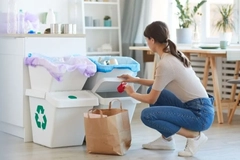Kiilto turns Finland’s household plastic waste into detergent packaging

Kiilto has introduced new packaging for its Serto detergent, which is made from Fortum Circo recycled plastic, a new material created from Finnish recycled consumer plastic packaging. Fortum Circo has less than half the carbon footprint of virgin plastic.
Anniina Rasmus, commercial manager at Fortum Circo says: “The Serto bottle is an excellent example of a circular economy product in which recycled consumer plastic packaging is given a new life as new plastic packaging. Plastic packaging will be subject to a recycled content obligation, which means that by 2030, all non-food contact packaging must contain at least 35% PCR plastic.”
According to her, the new material is suitable for many different applications. It offers a sustainable raw material option that can be customized to meet specific customer requirements for recycled plastic.
Demands for collaboration
Recycling plastic on a large scale requires collaboration across the entire value chain. The company is working to lower its indirect GHG emissions by 21% by 2031 compared to 2021. Kiilto also aims to achieve carbon neutrality in its production by 2028.
“Plastic collection and recycling are essential first steps in making reprocessed plastics possible. What matters most is what happens after collection and recycling,” says Kaisa Tuppura, head of marketing at Kiilto.
“The process for manufacturing new packaging from recycled plastic packaging is complex and requires collaboration between different sectors and companies. Serto detergent packaging combines the strengths of consumers and industry pioneers alike.”
She suggests that reaching these ambitious goals takes partners and a common will to succeed, underscoring the importance of the circular economy.
The move to incorporate recycled plastic into Serto detergent packaging aligns with Kiilto’s broader environmental goals, which include ensuring that 70% of its packaging materials are reused, renewable or recycled by 2025. By using Fortum Circo plastic, Kiilto has cut its consumption of virgin high-density polyethylene (HDPE) by 30 metric tonnes.
Consumers’ reference
Consumers are increasingly interested in sustainable packaging.
According to a recent study commissioned by Kiilto, 38% of consumers consider sustainability an important factor when purchasing laundry detergents. 75% of liquid laundry detergent users view recycled plastic packaging as a favorable choice, indicating a shift in consumer preferences toward eco-friendly products.
“In addition, 45% of liquid laundry detergent users would prefer to use recycled plastic packaging over other types of packaging,” Tuppura adds.
“I’m pleased that the results reflect consumers’ understanding of sustainability in terms of the packaging, the product itself and the manufacturer. It’s important to make continuous improvements in each of these areas. In addition to the recyclability of the packaging, it’s also important to consider the material it’s made of.”
Last month, Packaging Insights spoke to household goods companies about how consumer demand for eco-friendly solutions is driving advancements in biodegradable, compostable and recycled packaging materials.
According to the study, many consumers find it challenging to assess the sustainability of products due to vague claims and marketing gimmicks. It highlighted that sustainability-related factors for laundry detergent purchases are the recyclability of packaging, achieving a clean result with the minimum amount of detergent and the responsible operations of the manufacturer.
“The findings challenge us companies to communicate more clearly and better overall. Concrete actions help to communicate, ” Tuppura concludes.











